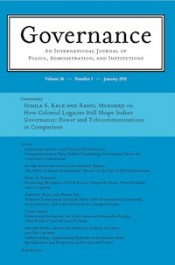Global governance: What Coen and Pegram don’t explain
 By Karthik Nachiappan. In a recent commentary for Governance, David Coen and Tom Pegram argue that the best way to improve global governance research is by synthesizing advances from three disciplines – International Relations, International Law and European Public Policy to enable scholars map, grapple with and overcome hindrances to global public policy-making. Though instructive, their agenda will not explain why ‘global governance is not working’ since their focus does not extend to the politics around the gridlock in global governance today.
By Karthik Nachiappan. In a recent commentary for Governance, David Coen and Tom Pegram argue that the best way to improve global governance research is by synthesizing advances from three disciplines – International Relations, International Law and European Public Policy to enable scholars map, grapple with and overcome hindrances to global public policy-making. Though instructive, their agenda will not explain why ‘global governance is not working’ since their focus does not extend to the politics around the gridlock in global governance today.
The gridlock, I argue, is linked to two developments which undoubtedly deserve more scholarly attention: West’s opportunistic multilateral impulses and the intent of rising powers to establish other multilateral frameworks like the Shanghai Cooperation Organization (SCO), BASIC Climate Change Group, India-Brazil-South Africa Forum (IBSA), BRICS and other recent initiatives like Asian Infrastructure and Investment Bank (AIIB) and New Development Bank (NDB). Going ahead, we need not focus entirely on the ‘global’ per se but on the ‘domestic’ in key countries to probe and elucidate their fluid attitudes and preferences toward the multilateral order and its rules.
As Coen and Pegram rightly identify, we are confronted by a spate of global problems in areas like finance, energy, climate change and health. Problems that many claim cannot be adequately addressed by existing governance mechanisms. And there is a general understanding that this gap has generated an institutional gridlock.[i] But this gridlock is not by any means new. A cursory peek into the negotiations of any major multilateral treaty over the past two decades reveal a polarized political climate where countries in the ‘North’ and ‘South’ clash over the rules of international rule. To be sure, the number of issues on the multilateral agenda have risen; issues also appear to be more complex. What has perhaps changed now is that countries are less willing to address trans-boundary problems in the formal multilateral order. This has presented political options for industrialized countries and emerging powers that both have exercised.
The first development is the West’s growing opportunistic engagement with the existing multilateral order. In the last ten years, the US Senate has either rejected or stalled a raft of relevant international treaties on labor, cultural rights, armed conflict, nuclear weapons, law of the sea, disability rights and discrimination against women. Funding is often withheld for multilateral institutions and purposes. Intermittently, Washington supports institutional restructuring in the IMF and the World Bank but seldom backs it up by action. In international health, western donors have begun to earmark their financial contributions for particular initiatives and tasks - multilateralism à la carte, siphoning funds away from the WHO’s institutional prerogatives.[ii] Rules around international trade are now wittingly entangled with intellectual property concerns, environmental protection checks and labor rights. This selective multilateral disposition appears to have domestic sources that revolve around diminishing public opinion toward international organizations, internal financial constraints and efficiency concerns vis-à-vis multilateral processes. No doubt, political economy also factors with rules being negotiated to advance particular interests within industrialized countries. To better understand this dynamic, more detailed empirical work is needed.
And the second trend, ostensibly linked to the first development, is the resolve of rising powers to establish alternate mechanisms to further mutual cooperation on issues like climate change, maritime security, health, trade and infrastructure. There is a political logic to these arrangements. Pooling collective and growing economic power boosts their political clout when negotiating international rules. Bargaining power also gives these countries more space to protect their flank when proposed rules conflict with their development or security interests. This collective bargaining is not a recent phenomenon as entities like the G-77 have long been a staple of the multilateral landscape. But there is a general acceptance that, this time around, the stakes are much higher since the economic clout of emerging powers have considerably grown distinguishing them from the bottom rung of developing countries. This leaves them less than tolerant of institutions and rules that do not reflect their interests. However, even as structural factors may explain the rise of these arrangements they cannot account for their gradual deepening. As newer initiatives like the AIIB and NDB emerge and evolve, we need to better understand and explain why emerging powers are opting to develop and deepen new arrangements while retaining one foot in the main multilateral camp.
As Coen and Pegram assert, a great deal of insight has been given to map and understand how governance works at the global level. The time has come to understand why governance is ‘not working’ at the global level.
Karthik Nachiappan is a PhD Candidate at the India Institute, King’s College London. His research investigates India’s multilateral behaviour as a rising power across a range of issue areas including nuclear non-proliferation, climate change, global health and international trade.
[i] Hale, T., Held, D., & Young, K. (2013). Gridlock: Why Global Cooperation is Failing When We Need It Most. Polity.
[ii] Sridhar, D., & Woods, N. (2013). Trojan Multilateralism: Global Cooperation in Health. Global Policy, 4(4), 325-335.

[…] posted on Governance Journal’s Blog, a response to Coen and Pegram’s commentary on Global Governance […]
Response to Governance Commentary on Global Governance « Karthik Nachiappan
September 30, 2015 at 9:30 pm